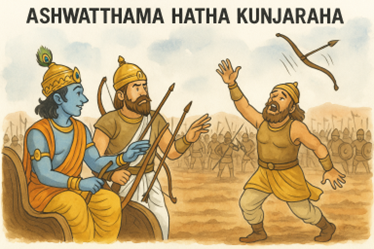



Ambiguity won a war once—perhaps it can also save India’s exporters from tariff arrows.
By Ravishankar Kalyanasundaram
There was once a God who knew the power of what is said—and what is left unsaid. On Kurukshetra, Krishna had Yudhishthira declare Ashwatthama Hatha Kunjaraha—“Ashwatthama is dead… the elephant.” Drona heard only the first part, dropped his bow, and the war shifted. A mighty warrior was undone not by steel, but by a sentence.
Fast forward to today. The battlefield is Washington, the arrows are tariffs, and the warrior is Donald Trump. India’s alleged claim that it alone “called the truce” with Pakistan left Trump fuming. And when Trump fumes, tariffs usually follow. A well-timed half-phrase could have left everyone satisfied. Instead, clarity—or the perception of it—set off another round of threats.
When Subtlety Saves
Imagine if Modi had borrowed Krishna’s playbook. A knowing smile, an artful pause, and a line like “Yes, yes, we spoke… it was important… the matter is handled.” Trump could have gone home a peacemaker, India a sovereign, and exporters would still be sleeping peacefully.
Instead, the lack of ambiguity has bankers wide-eyed over “volatility,” exporters letting their spouses answer calls about bedridden mothers-in-law, and diplomats working overtime to re-spin headlines. Chambers of Commerce have discovered late nights, while frequent flyers alone rejoice at the extra miles.
Wisdom Over Rhetoric
The Mahabharata reminds us: battles are often won by words, not weapons. Krishna’s genius lay in timing, framing, and orchestration. That wisdom applies today. Brave speeches in Parliament may draw applause, but they do not disarm tariffs. Strategy, not sound, is what wins trade and peace.
History has always rewarded ambiguity well used. Churchill soothed a battered nation with careful phrasing. Narasimha Rao liberalised an economy by saying little and doing much. Even Franklin Roosevelt bought time with technically true but temporary assurances. The art of leaving things unsaid is as old as statecraft itself.
The Modern Kurukshetra
In Trump’s America, tariffs are arrows and credit is currency. To navigate that battlefield, ambiguity is not weakness—it is armour. Diplomacy is theatre, and in theatre, the audience hears what it wants. A blurred phrase might have been enough to unstring the tariff bow.
Instead, we now see the overtime economy in action. Bankers crunching scenarios past midnight. Exporters rehearsing their excuses. Suppliers lighting lamps at temples. And diplomats, normally guardians of understatement, labouring over communiqués that read like apologies.
Where Are the Krishnas?
Where are the wise men? Where is Cho Ramaswamy, who could have turned the whole episode into a biting skit by lunchtime? Where are those pandits, who arrived right on time for demonetisation, to now offer ballast against tariff arrows? We have plenty of rhetoric, but little of Krishna’s craft.
Perhaps what we need is just that—someone to play Krishna, scripting the ambiguity, letting Modi be Yudhishthira, bound to straight speech, while still shielding the economy from a storm. Let Trump, convinced of his own victory, happily discard his tariff bow.
Eternal Relevance
It is not for nothing that the Mahabharata is called the fifth Veda. Its lessons outlive the battlefield. Timing, ambiguity, and strategy matter as much in trade wars as in Kurukshetra. A single phrase can turn despair into triumph—or exports into overtime.
Handled wisely, ambiguity is not cowardice. It is survival with a smile. Sometimes the most effective defence is not a shield but a silence, not a roar but a whisper drowned by bugles.
A Gentle Close
Tariffs may or may not come. Trump may or may not claim credit. But India must learn: global diplomacy is not won in the decibels of Parliament. It is won in the silences of corridors, the half-smiles of leaders, and the wisdom to let others hear what they want.
As Krishna showed Yudhishthira, sometimes it is enough to say just enough—and let the bugles do the rest.